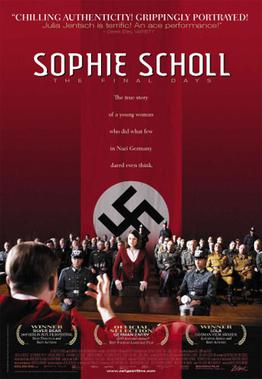As the title indicates, this movie is about the last week of Sophie Scholl’s life. She was a famous resistance figure in Nazi Germany. It is a German film directed by Marc Rothemund. It was nominated for Best Foreign Language Film at the Academy Awards (losing to “Tsotsi”). It premiered at the Berlin International Film Festival where it was nominated for best film and won for director and actress (Julia Jentsch). The movie covers the period from Feb. 17-22, 1943. It was shot in chronological order.
The movie starts with Sophie and three men mimeographing leaflets. They are members of the non-violent protest group called The White Rose. Sophie’s brother Hans (Fabian Hirichs) plans to place them on the campus of the University of Munich. When the others tell him it’s too risky, he says he’ll take full responsibility. (He does not promise he won’t talk if he is arrested.) Sophie supports her brother. They proceed to put stacks in the hallways while classes are in session. They get caught. The rest of the movie concentrates on the interrogation of Sophie by inspector Robert Mohr (Alexander Held). This allows for some debating of her liberal principles as opposed to his Nazism. She, Hans, and the leaflet writer are put on trial before a cartoonish Nazi judge. The trial gives the accused some opportunity to state their opinions about how Hitler is bringing Germany down. The result of the trial is inevitable.
Sophie Scholl has become a heroine in modern Germany. This is not the first movie about her or specifically about her last days. Julia Jentsch is outstanding as the 21-year-old martyr. Speaking of which, the movie does have a lot of lot of religion in it. Alexander Held is the stand-out as the sympathetic Mohr. The acting is important because the movie has the vibe of a play. There is more dialogue than action. Not a surprising amount of dialogue for a movie that concentrates on an interrogation and a show trial. I have a feeling the movie took some liberties in allowing Sophie and Hans to make speeches before a hostile Nazi judge. In fact, they are treated amazingly well for people accused of high treason, demoralizing the troops, and aiding the enemy.
The movie is a nice tribute to a brave woman, but it could have used some background on how she got to that week. Her story is an interesting one, but this movie leaves you with the impression that she is famous not so much for her heroism, but for her following a foolish brother to their deaths. One can’t help but wonder how much more she could have accomplished if she had not put herself in mortal danger. But martyrs are better for a cause than live people sometimes. The movie appears to be accurate with the exception of the speeches given in the court and the ridiculous arrival of her parents. The Mohr character is based on a Gestapo agent who headed the efforts to ferret out the White Rose. He claimed after the war that he had tried to save Sophie’s life by having her testify against her brother. That seems unlikely to me.
“Sophie Scholl: The Final Days” is a good movie that could have been better if it had not restricted itself to just the end of her story. It is better than the similar “Alone in Berlin”.
GRADE = B
HISTORICAL ACCURACY: Sophie Scholl was born on May 9, 1921. He father was a liberal politician who was mayor of her home town. They were a middle-class family and she was well-educated. She and her siblings were seduced by Nazism. Her brother Hans joined the Hitler Youth and she joined the League of German Girls. Hans became disillusioned with Nazi indoctrination and quit. Sophie graduated from high school and became a kindergarten teacher. She was forced into National Labor Service and she hated the military oppressiveness of the organization. After her six months, she went to college and became a liberal and an intellectual and traveled in those circles. In 1937, her father (who had warned his children of the evilness of Nazism) was arrested for criticizing Hitler at work. Her brother was arrested for anti-Nazi activities. He and his friends formed the White Rose to encourage passive resistance. Sophie was not originally in it. Her boyfriend wrote letters from the Eastern Front where he witnessed the executions of Soviet prisoners and Jews. When she learned of Hans group, she insisted on joining. The White Rose distributed leaflets and did some graffiti (“Down with Hitler”). The leaflets would be left at Munich University. On Feb. 18, 1943 they left leaflets at the university during classes. This was the sixth set of leaflets and they began: “Our current ‘state’ is the dictatorship of evil.” They questioned students whether they wanted to accept “the machinery of state, under the command of criminals and drunkards?” Hans and Sophie were safely away when they realized they still had some leaflets in a suitcase. They went back in to hurriedly place them. Sophie threw some from a balcony and she was seen by the janitor who happened to be a fanatical Nazi. Hans and Sophie were arrested. Hans confessed under torture and Sophie decided to admit her involvement to shelter others. She, Hans, and Christoph Probst were guillotined on Feb. 22, 1943. Before her death she proclaimed: “Somebody, after all, had to make a statement. What we wrote and said is also believed by many others. They just don’t dare express themselves as we did.” Millions of copies of the sixth leaflet were printed by the British and dropped over Germany. Sophie became the most famous female anti-Nazi figure in the war.

No comments:
Post a Comment
Please fell free to comment. I would love to hear what you think and will respond.